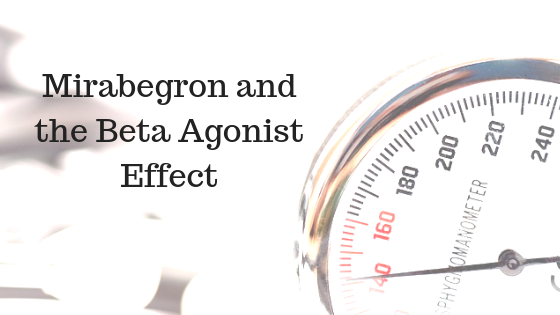A 76 year old female has a history of urinary urgency and frequency. About a month ago she was started on mirabegron. She has been tried on tolterodine and oxybutynin. Tolterodine did not work that well for her so it was discontinued. Oxybutynin did help some, but she was so bothered by dry eyes and dry mouth that she would rather deal with the urinary symptoms. Remember that both oxybutynin and tolterodine are anticholinergics.
At the visit 1 month ago, she visited her PCP and she was started on mirabegron 50 mg daily for overactive bladder. At that time, her vital signs were pulse = 83 BPM and blood pressure =138/84.
At presentation today she notes that her symptoms have improved some. This medication was somewhat expensive for her, but she was ok with the cost of the medication as long as it was helping some. Her vital signs had changed significantly at her visit today. Her blood pressure was 149/91. Pulse was 88 BPM.
If you remember the mechanism of action of mirabegron, this should help you remember its adverse effect profile. Mirabegron is primarily a beta-3 agonist, but if we get into a situation where we have more effect on beta-1, we can contribute to hypertension and possibly tachycardia. We would want to rule out other causes for the rise in blood pressure. If she is on blood pressure medication, patient adherence is usually the place that I start with. In a 76 year old, depending upon the patient, we may have a little more relaxed blood pressure goals in this patient.
Another important point; the PCP started the dose of mirabegron at 50 mg. As doses go higher, we generally tend to lose selectivity for the receptors that we want. The usual starting dose of mirabegron is 25 mg per day.
Love the blog? Get a free gift simply for following! Over 5,000 medication loving healthcare professional have taken advantage of this!



Great point about the loss of selectivity as the dose increases
The rise in pulse is negligible. Looking at the literature the placebo group and 50 mg dose group were roughly equal re rise in BP. As you smartly mention there are many variables which may cause a temporary spike in vitals, i.e. activity, temperament at the time vitals were taken. You mentioned a concern she had re cost. That may have been enough to cause anxiety thus raising her BP modestly. She was pre-hypertensive prior to start of this new therapy. We definitely need more of the picture. Renal function, weight prior start of therapy, current weight to determine if urinary retention is now an issue causing fluid overload? Before we start tinkering with the regimen, we need to get the full picture. Her major complaint of urgency is better according to the patient. So, we can not lose sight of quality of life. She is 76, not 56. Hopefully modest adjustments to BP meds or a diuretic if on board may be all that is neccesary. As a pharmacist I often have to remind myself patients just want to feel better, and not receive a pharmacology lesson. Good stuff, keep up the awareness.
Thanks for the comment!
The mechanism of this medicine is very controversial. Could you recall please the mechanism?
According to the article ( https://www.ncbi.nlm.nih.gov/pmc/articles/PMC472841/ ) is this drug β3‐adrenoceptor‐selective and and antagonism of α1‐adrenoceptors contributes to the observed relaxation responses in urethra. But, how β1‐adrenoceptor‐selective is mirabegron? and has more effect on beta-1 ?
Thanks you in advance for your help.